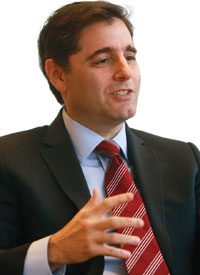
Item: The Los Angeles Times, in a December 24 article entitled “Pristine areas of the West are again preserved,” reported: “Restoring a policy abandoned by the George W. Bush administration, the top Interior official on Thursday gave the agency that manages 245 million acres of public land the authority to temporarily protect pristine areas of the West. Interior Secretary Ken Salazar, who issued the order, called it ‘a new chapter in terms of how we take care of our Bureau of Land Management lands.’”
Under the “directive,” said the Times, the “bureau will now compile an inventory of ‘wild lands’ and, as part of its public planning process, has the authority to keep them off-limits to development.”
Item: The Washington Post, in a December 24 article entitled “White House presses for new climate, wilderness protections,” reported: “The Environmental Protection Agency announced Thursday that it will regulate greenhouse gas emissions from power plants and oil refineries next year in an attempt to curb global warming. The move, coming on the same day the Interior Department unveiled a plan to protect a broader swath of the nation’s wilderness, demonstrated that the Obama administration is prepared to push its environmental agenda through regulation where it has failed on Capitol Hill.”
The Post also noted: “Combined with an earlier EPA rule targeting cars and light trucks, the agency is poised to regulate sectors accounting for more than 55 percent of the nation’s total greenhouse gas emissions.”
Item: On December 21, ABC News reported on its website:
A narrowly divided Federal Communications Commission today approved bold new rules aimed at preventing broadband service providers from censoring how individuals and organizations can surf the Internet’s fastest pipes. The so-called “net neutrality” regulations prohibit the suppliers of Internet connections to millions of American homes and offices from blocking access to certain websites, applications or services so long as they are legal.
Companies will also be required to publicly disclose information on their practices, performance characteristics and commercial ties. “Today, for the first time, we are adopting rules to preserve basic Internet values,” said FCC chairman Julius Genachowski. “For the first time, we’ll have enforceable rules of the road to preserve Internet freedom and openness.”
Correction: Save us from reformers so fervent to do good that they seek to right us from wrongs that do not exist. Moreover, even if there are problems, it is not appropriate for these busybodies to impose themselves on us. Worse yet are those reformers who would rule by federal regulation.
That, however, seems to be where we are headed, this year in particular, with an arrogant bureaucracy and overweening executive branch trying to impose its agenda through edicts.
Of course the camel who puts his nose inside the tent — just a wee bit, and only for a while — doesn’t tell us that before long entire clans of appointed camel experts will be on the inside running the show, issuing fiats concerning how we may live and work.
Which brings us to several examples at hand, including eco-activists at the Environmental Protection Agency and Interior Department and appointed arbiters at the Federal Communications Commission. They have seen their duty — often making it up as they go along — then overdone it.
Their unilateral regulatory decisions were made after an angry populace turned out many of the worst members of Congress because they wanted to inflict more job-killing restrictions on the country. Shortly after the election, therefore, the EPA just up and issued new emission guidelines to states that will burden industry and consumers alike. And just before Christmas, hoping few would notice, the bureaucrats implemented new facets of their eco-agenda. The FCC’s intrusion into Internet operations came before the new Congress had unpacked.
Since vague rules are easy to manipulate, three Democratic commissioners decided to inflict “net neutrality” regulations. The made-up scare used to justify the move was that Internet providers might block access to legal websites. “The regime isn’t needed. Providers weren’t doing that anyway,” noted the Detroit News.
Nevertheless, said the Detroit paper, the FCC “gave itself the power to determine if a network is ‘unreasonably discriminating’ against a content provider in determining how quickly to allow content to appear on consumers’ computer screens. In other words, the FCC has given itself the authority to involve itself in the business decisions of Web access providers.”
And, the commission did this despite the fact that it was violating a federal court order against a previous attempt to regulate the Internet. Chairman Julius Genachowski still maintains that his commission has “ancillary” jurisdiction over the Internet under a 1996 telecommunications law. Yet, as the D.C. Circuit Court of Appeals observed last spring: “Were we to accept the theory of ancillary authority, we see no reason why the Commission would have to stop there, for we can think of few examples of regulations that [the Commission] … would be unable to impose upon Internet service providers.” If you think for a second, you can see how content management and Internet taxation might be subsequent steps.
Two Republican commissioners opposed the move; the three Democrats on the five-man commission had the numbers. As one of the GOP commissioners noted, analysts and broadband companies, large and small, had told the commission “that new rules are likely to have the perverse effect of inhibiting capital investment, deterring innovation, raising operation costs, and ultimately increasing consumer prices.” In his dissent, Commissioner Robert McDowell wrote that the new rules could be used as a weapon by which “politically favored companies will be able to pressure three political appointees to regulate their rivals to gain competitive advantage.”
This regulatory putsch did not happen by accident. John Fund in the Wall Street Journal did yeoman’s work in exposing the Left-liberal foundations’ backing of this effort, which is also supported by the President, who is “seeking to impose his will on the Internet through the executive branch.” Commissioner Genachowski, pointed out that Fund,
a former law school friend of Mr. Obama, has worked closely with the White House on the issue. Official visitor logs show he’s had at least 11 personal meetings with the president.
The net neutrality vision for government regulation of the Internet began with the work of Robert McChesney, a University of Illinois communications professor who founded the liberal lobby Free Press in 2002. Mr. McChesney’s agenda? “At the moment, the battle over network neutrality is not to completely eliminate the telephone and cable companies,” he told the website SocialistProject in 2009. “But the ultimate goal is to get rid of the media capitalists in the phone and cable companies and to divest them from control.”
A year earlier, Mr. McChesney wrote in the Marxist journal Monthly Review that “any serious effort to reform the media system would have to necessarily be part of a revolutionary program to overthrow the capitalist system itself.” Mr. McChesney told me in an interview that some of his comments have been “taken out of context.” He acknowledged that he is a socialist and said he was “hesitant to say I’m not a Marxist.”
Fund laid out the campaign in some detail, including the creation of “a network of liberal foundations that helped the lobby invent the purported problem that net neutrality is supposed to solve. They then fashioned a political strategy similar to the one employed by activists behind the political speech restrictions of the 2002 McCain-Feingold campaign-finance reform bill.” When the campaign was over, as he summarized, the so-called media reform movement had “paid for research that backed its views, paid activists to promote the research, saw its allies installed in the FCC and other key agencies, and paid for the FCC research that evaluated the research they had already paid for. Now they have their policy. That’s quite a coup.”
Power grabs, as noted, don’t just happen. When President Obama was not able to get what would have been disastrous “cap-and-trade” legislation though Congress last year — and lost many of his supporters in the subsequent elections — he was hardly derailed. The day after the voting, Obama said: “Cap-and-trade was just one way of skinning the cat; it was not the only way. It was a means, not an end.” So now regulators will regulate CO2 emissions, deciding how much carbon dioxide — the very air that human beings breathe out — will be allowed since it has been deemed harmful to human health.
Other regulators are issuing orders that demand that automobiles must get 62 miles per gallon in 14 years. Yet others are placing vast tracts of land off-limits to development regardless of the need or the enormous resources they possess. Such areas include the Green River Formation of oil shale deposits in Utah and Wyoming, which have the equivalent of an estimated 1.5 trillion barrels of oil.
The Interior Department is seeking a way around Congress, points out Peter Wilson in the American Thinker. The department need only “designate a ‘Wilderness Study Area,’ which places the land off-limits until Congress comes to a decision about its status.” The department could “potentially close off Green River to any commercial activity unless Congress takes action” and can even rescind leases already granted — which adds “insecurity to companies considering investing in oil shale development.”
The editors of the New York Times see this deployment of executive power, unsurprisingly, as “a very welcome move.”
The Justice Department in the Obama administration argues that the Clean Air Act requires that the EPA set climate rules. Never mind that the Congress thought otherwise. The administration would find another excuse if necessary, but it should be a lesson to those in Congress who give broad and vague powers to a regulatory agency and then step away from the table. (It should also be noted that the EPA itself was created by Republican President Richard Nixon, trying to curry favor from the Left.) As Andrew McCarthy has written in National Review Online: “Under the 40-year-old Clean Air Act — legislation passed in a very different era, under very different assumptions — this endangerment finding is a pretext for government’s administrative juggernaut to impose ruinous curbs on all CO2 emitters, everything from large factories to small homes.”
The president of the West Virginia Coal Association, Bill Raney, has observed, “This is arrogant and wrong! It is essentially a way of saying: ‘in your face, Congress!’” (Charleston Daily Mail, December 23, 2010)
Meanwhile, the United States’ percentage of emissions globally is shrinking — even as China’s emissions are expected to double in a decade and India’s to triple over that period. But facts have little meaning to agencies that believe they can do whatever they please and don’t report to the people.
We don’t have to take this treatment. Congress can be pushed to withhold funding to agencies if they don’t have the votes to eliminate them. And the Congressional Review Act permits lawmakers to assess and, if necessary, overrule government administrative regulations. To be sure, it is never easy to overturn the status quo, and regulators and the executive branch will fight for every inch they have grabbed. But we can’t escape the responsibilities of tomorrow by evading them today.
— Photo: AP Images


